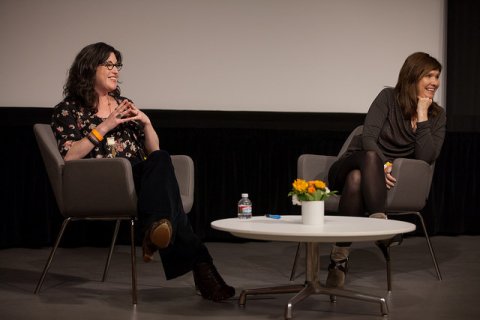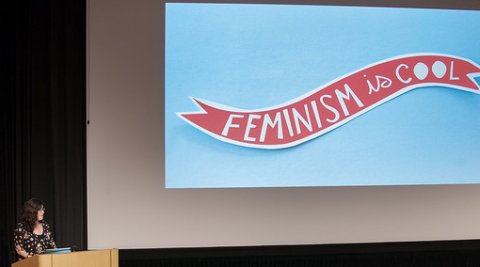
Co-founder of Bitch Media, Andi Zeisler, (left) joined USC Annenberg School of Communication director, Sarah Banet-Weiser (right), for conversation about why pop culture matters to feminism, activism and social justice.
The event, titled “Don’t Just Change the Channel: Why Pop Culture Matters to Feminism, Activism and Social Justice,” was opened by director of the School of Communication Sarah Banet-Weiser before Zeisler dove into a presentation hitting eight major points — noting the power behind harnessing pop culture as a positive force in advocating for feminism among other social issues. Founded by Zeisler and high school companion Lisa Jervis “on the idea that if nobody speaks up, nothing is going to change,” Zeisler said it wasn’t the magazine’s slightly scandalous title that raised eyebrows when Bitch first launched in 1996. “Having the word ‘feminist’ in the magazine subtitle has been far more controversial than having the word ‘bitch’ in the title,” Zeisler explained. “That’s because the word ‘bitch’, for better or worse, has become part of our cultural lexicon. Yet ‘feminist’ is still one of those words that people find very hard to understand.”
While Zeisler said “really exciting” improvements have been made in the diversification of women represented in pop culture, the everyday sexism seen in the media Bitch originally set out to bring attention to and critique has not completely vanished in the almost 20 years since the magazine’s inception. “I tend to feel a big part of what people misunderstand about feminism is that it’s still very relevant despite the fact that some of what earlier feminists fought for has come to past,” Zeisler said. “There’s this idea that some women gained some ground in some areas, feminism happened and we’re all done. That’s absolutely not true.” Now more than ever, Zeisler said we must pay attention to how we consume products of pop culture because, as she put it, the stories media tell are the ones we believe. Presenting images of women in mainstream media to the completely full auditorium of attendees, it became clear that many of the deep rooted stereotypes and narratives surrounding what it means to be a woman in modern society are largely connected to what we see in film, television and music. The over-sexualization of women in alcohol advertisements, violence against women within the fashion industry and the laser-point focus on female celebrities’ bodies by tabloids were just a small sample of pop culture hypocrisy brought up by Zeisler.
For more images from the event, visit USC Annenberg on Flickr.
Audience members were also able to ask Zeisler questions, spanning topics from celebrity intervention into feminism, the political implications of companies selling feminism and the importance of educating youth on media literacy. At the core of Zeisler’s presentation was the idea that pop culture’s significance in our lives is immutable and the crucial need to utilize a feminist lens on media to better understand women’s perceived role in society. “The question at the heart of every wave of feminism has always been, are women human beings with the same liberties and rights as men?,” Zeisler said. “And that question, despite everything that is going on with feminism being a hip new club, is contested every day in politics, in entertainment, the workplace, in court and in academia.” For those studying media or interested in paving a career in the field, Zeisler offered advice on how to bridge those passions with feminism. “Figure out what you’re most passionate about because [pop culture] a big subject and it can be pretty daunting. Then figure out how to incorporate your feminism into that” Zeisler said. “These days it’s easier than ever to make your own media.”
For more images from the event, visit USC Annenberg on Flickr.